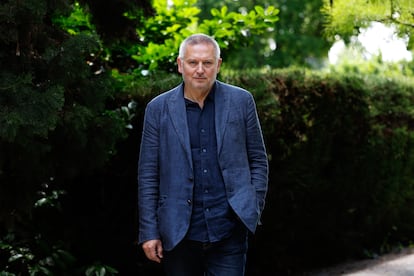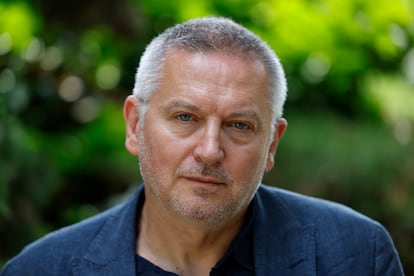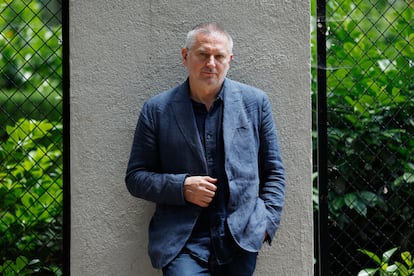Georgi Gospodinov, winner of the International Booker Prize: ‘Death is not a great tragedy, the aging process is’
The Bulgarian writer visited the Madrid Book Fair to sign copies of his award-winning novel. ‘Time Shelter’ – translated into English by Angela Rodel – is about the obsession of living in the past, in an era in which the future has been abolished

“This is how Madrid smelled, of beer and urine… it’s undeniable that there was joy in that smell.” This description of the Spanish capital in the 1980s appears in the novel Time Shelter, written by the 55-year-old Bulgarian writer, Georgi Gospodinov. He says that Madrid is a good place to experience a second youth. Today, the author — whose novel was just awarded the prestigious International Booker Prize — is visiting the city in the 21st century, to attend the Madrid Book Fair. Last Sunday, in El Retiro park, between booths and crowds, it didn’t smell of piss and beer, but of springtime. There was joy in a morning that was touched by sun and literature.
Curiously, around this time, another book fair is being held in Sofia, the capital of Bulgaria.
Gospodinov also appeared there, with his latest award under his arm. He attended a book-signing that had so many people that, according to Spanish-Bulgarian translator Maria Vútova, the police had to break up the queue when the fair was over. Still, Gospodinov’s readers didn’t give up on trying to get his signature.
The plot of the novel revolves around a character, Gaustine, who creates a kind of clinic for people who lose their memory. Within the institution, different decades of history are reproduced in each room: the 1960s, the 1980s, etc. “Memory loss is one of the fears that affects me the most, that affects society the most… that’s why I write about it. I suppose that it’s a fear that will be stronger in increasingly aging societies, where we want to live for longer and longer,” Gospodinov explains, while sitting in the park. “The price of all of this is memory.”

In the novel, those affected by forgetfulness — be it in the form of Alzheimer’s or dementia — can live in a comfortable past. The idea is so successful that healthy people also demand those pasts… and this demand eventually exceeds the limits of the clinic. Soon, towns, cities and even entire countries are formed, where residents can live in another era. A referendum is held across Europe, with each nation choosing the historical moment in which they want to live. This ends up causing a new form of global conflict. “With the ongoing war in Europe, we see that the immune system against barbarism has holes,” the author notes. “It can take us to a point similar to World War II, as if Putin has decided to fight in a past decade: the 1940s.”
Time Shelter is a strange, fragmented, unstructured novel, one that revolves around memory, nostalgia and the fear of an abolished future. “My three novels are strange, non-linear… they’re not like a train that leaves from point A and arrives at point B,” the Bulgarian clarifies. “They have a lot of alleys. Sometimes, the author will stop in one of those alleys and start talking to the reader!” With this chaotic structure, Gospodinov tries to recreate the non-linear nature of thought. Nowadays, the genre of the novel is a very flexible structure, where various types of narrative creations can be housed.
The theme of this year’s Madrid Book Fair is science, so it’s a nice coincidence that this subject continually infiltrates Gospodinov’s work. If this novel has to do with time and neurology, his previous ones are related to physics (The Physics of Sorrow) and natural history (Natural Novel). “I’ve always thought that literature can lend a hand to science,” the author muses. He’s in no rush when he speaks — he puts his hand to his chin, focusing his blue eyes on the ground, always taking a few seconds to think about his answers.
The great tragedy of aging
“Death isn’t a great tragedy… the great tragedy that nobody writes about is the aging process,” he notes. “That’s why I have a dialogue with the passage of time: I think that by narrating things, we slow it down. Time is distracted if we start telling it something.” Gospodinov is so obsessed with time that, at the age of 10, he was already writing poems about growing old. Adults scolded him: such a small child should not occupy himself with such things. “But children are interested in death,” he sighs.
Does social media help record each day and thus slow down time? “That’s [part of] external memory,” the writer observes. “I think [social media] is part of the path towards oblivion.” He evokes Phaedrus, one of Plato’s dialogues, where it’s discussed if the written word can harm memory, by encouraging its abandonment. He is also reminded of one of Zeno’s paradoxes: if an arrow is still at every instant during its movement, the movement doesn’t exist. If we were to note down every moment of time, time would stop.

Gospodinov was born in communist Bulgaria. In his latest novel, he speaks of a certain nostalgia for communism among the youth, who think of it as a lifestyle. “There are certain traffickers who sell a false, fictitious, unconstructed past; they’re populist politicians, trying to revive a nationalism linked to communism, which are always intertwined,” the author says. That’s why, in the book, so many countries choose the 1980s as a good era to relive: [during that era] in Spain, a dictatorship was ending; in Bulgaria and the countries of the East, totalitarianism was coming to a close. However, if it were up to Gospodinov, he would choose to spend an afternoon in 1968: “It was the year I was born. My parents were young. Everyone was young, even Mick Jagger.”
“But it would be different from what’s expected,” he ponders, “because nobody is aware that they’re living a historic moment until time has passed.” In his book, there’s a character who would like to be 12-years-old in each of the decades.
The extremes of Europe
Understanding what unites Bulgaria and Spain — two countries at the opposite ends of Europe — could be key to understanding the essence of what it means to be European.
The writer sees similarities in the dictatorial pasts of both countries and the subsequent democratic openings.
“I think that, in both Bulgaria and Spain, there’s accumulated sadness… [but] in Bulgaria, it hasn’t been narrated. That’s dangerous,” the author opines. There’s another difference between the two countries: in his, there’s a greater yearning for Europe, which was previously inaccessible [when Bulgaria was] behind the Iron Curtain. Gospodinov’s parents couldn’t travel to London, Paris, or Madrid. In Time Shelter, he writes about the popularity that pirated Spanish films had in his country. These movies acted as a form of erotic entertainment that managed to cross the entire continent.
“Anodyne times are easier to inhabit,” the novel notes. Gospodinov speaks of futurephobia — of that abolished future, so typical of this era, in which the catalogue of potential ends of the world is diverse and full. The author tries to analyze the reasons for why the past floods us so easily, why nostalgia overwhelms us. “This has to do with the lack of future,” he says. He used to think that the future was cancelled… but a mother of a small child begged him to please leave some room for hope. Since then, he prefers to talk about a postponed future. “Like flights at airports,” he explains.
When asked if it’s possible to live without an idea of an assured future, he pauses before replying. “That’s the big question. I think it’s very difficult. Actually, the future isn’t a place — we will never live in the future, it will always be beyond us. But it’s necessary to have that perspective.”
Sign up for our weekly newsletter to get more English-language news coverage from EL PAÍS USA Edition
Tu suscripción se está usando en otro dispositivo
¿Quieres añadir otro usuario a tu suscripción?
Si continúas leyendo en este dispositivo, no se podrá leer en el otro.
FlechaTu suscripción se está usando en otro dispositivo y solo puedes acceder a EL PAÍS desde un dispositivo a la vez.
Si quieres compartir tu cuenta, cambia tu suscripción a la modalidad Premium, así podrás añadir otro usuario. Cada uno accederá con su propia cuenta de email, lo que os permitirá personalizar vuestra experiencia en EL PAÍS.
¿Tienes una suscripción de empresa? Accede aquí para contratar más cuentas.
En el caso de no saber quién está usando tu cuenta, te recomendamos cambiar tu contraseña aquí.
Si decides continuar compartiendo tu cuenta, este mensaje se mostrará en tu dispositivo y en el de la otra persona que está usando tu cuenta de forma indefinida, afectando a tu experiencia de lectura. Puedes consultar aquí los términos y condiciones de la suscripción digital.








































